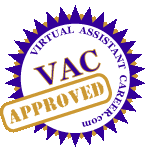 What’s the first thing you think of when writing with keywords?
What’s the first thing you think of when writing with keywords?
Probably one of the first is that keywords and phrases are descriptive of the products and/or services you’re writing about. But, what happens in those circumstances where you can’t (or don’t really want to) use your chosen keyphrases descriptively?
Is Your Product/Service Really Cheap?
One of the primary things that causes this dilemma is the word “cheap.” There’s a big difference between somebody typing “cheap travel insurance” into a search engine query field and you calling your own insurance cheap. Nobody really wants “cheap” insurance. That brings up images of companies that go out of business, don’t return calls, fight you on paying claims, etc.
| Join Karon Thackston in our NEW Virtual Assistant Specialty Education Series (VASES): Writing Website Copy that Ranks High & Gets More Clients! Starting October 10th, 2011, this 6 week training program by a copywriting expert will teach you how to write copy that not only will sell your services but will rank your services webpage high in the search engines to boot! Your clients will NOW not only find you, they’ll start begging you to help them with their website copy. AND we all know what that means? More $ervice hours for you, the VA! CLICK HERE TO LEARN MORE |
What customers want is inexpensive or affordable insurance. Problem is, in their haste, they type in the first thing that comes to mind. Average Joe doesn’t understand that search engines are (in part) matching the words in their query to words on web pages. “Cheap travel insurance” may be the keyphrase you want and need to target, but you certainly don’t want to label your own product as “cheap.” What else can you do?
Use that search term with the opposite meaning.
Perhaps your copy could read something like this:
Affordable? Budget-friendly? Absolutely! But this is certainly not cheap travel insurance. Coverage is underwritten by one of the most trusted and well-respected companies. With this policy, you’ll find benefits comparable to more expensive coverage, but with rates at or below what the cheap travel insurance companies charge.
See the difference? Instead of writing “We sell cheap travel insurance,” and degrading your product in the eyes of your customer, you actually use the search term to elevate your product to a higher level of quality.
Legalities That Get in the Way
Another issue with many keyphrases is that they violate government regulations if used to describe a product. You find this often with health supplements. The FDA (and other such agencies around the world) has a long list of what manufacturers can and cannot say with regard to their products. This is mainly in an effort to protect the consumer against snake oil salesmen who make fraudulent claims.
For instance, you cannot call your supplement a cure. In many countries you can’t even call your product a remedy. And so, you face the issue with those ever-popular search terms that use “remedy” and other such words within them.
One of my favorite techniques is to ask questions that incorporate these keywords.
You can’t legally say, “Here’s a new heartburn remedy we’ve just released.” But you can ask questions like:
Tired of that same old heartburn remedy that doesn’t work? Wish someone would create something new?
Looking for a heartburn remedy that doesn’t require a prescription?
Is your heartburn remedy falling short?
You’re not saying *your* product is a heartburn remedy; you’re just asking questions about what the customer might want or need.
When you’re writing with keywords, you really have to think outside the box. We typically get stuck and have tunnel vision when we write SEO copy. The keywords get inserted the same way over and over. But there are so many different methods (like the one listed above) for using search terms when you write.
If you diversify your SEO writing skills, you’ll find your copy becomes more natural-sounding and is able to communicate its message better. Why stick to just one ordinary way to write with keywords when there are so many to choose from?
Author: Karon has owned her own full-time copywriting agency since 1999. During that time, she has authored and self-published several books including the popular Step-by-Step Copywriting Course (5th Edition), Writing With Keywords, and How to Write Successful PPC Ads . She has also written two ebooks for the Wordtracker Masterclass Series; Ecommerce Copywriting and Article Marketing: The Write Way to Build More links.
Karon is currently the Copywriting Moderator of the High Rankings Forum and has spoken at Search Engine Strategies, Search Marketing Expo, NAMS and Internet Summit conferences.
Now she is sharing her knowledge with you through this insightful course available exclusively through VAnetworking.
Seats are limited so REGISTER EARLY to hold your seat!




Hi Karon,
Veru insightful post. Another A’ha moment for me regarding copywriting.
Thank you very much!
Edna Campos